
Current Opinion in Biomedical Engineering
metrics 2024
Empowering researchers with impactful reviews.
Introduction
Current Opinion in Biomedical Engineering is a renowned journal published by Elsevier, focusing on the cutting-edge developments and critical assessments in the fields of biomedical engineering and related disciplines. With an ISSN of 2468-4511, it provides a valuable platform for researchers and professionals to disseminate their insights and discoveries in areas such as bioengineering, biomaterials, and medicine. Its impressive impact factor positions it in the Q2 category for several fields, including Bioengineering and Biomedical Engineering, highlighting its influence and relevance in ongoing scientific dialogues. The journal’s unique format of opinion pieces and reviews encourages innovative thinking and fosters collaboration among experts. As an essential resource for those engaged in the life sciences and engineering, Current Opinion in Biomedical Engineering serves to stimulate discussion, promote knowledge exchange, and drive advancements in biomedical applications. Set in the Netherlands at Radarweg 29, 1043 NX Amsterdam, the journal is accessible through various academic platforms, enabling a global readership to engage with the latest scholarly work in this dynamic field.
Metrics 2024
 0.80
0.80 4.70
4.70 4.20
4.20 42
42Metrics History
Rank 2024
Scopus
IF (Web Of Science)
JCI (Web Of Science)
Quartile History
Similar Journals

Cellular and Molecular Bioengineering
Exploring Cellular Dynamics Through Molecular InsightsCellular and Molecular Bioengineering, published by SPRINGER, is a prominent journal dedicated to the exploration of interdisciplinary approaches in the fields of biochemistry, genetics, and molecular biology. With an ISSN of 1865-5025 and an E-ISSN of 1865-5033, this journal has been a pivotal resource since its inception in 2009, showcasing groundbreaking research that combines innovative modeling and simulation techniques with cellular and molecular applications. As a Q2 journal in both Biochemistry, Genetics and Molecular Biology (miscellaneous) and Modeling and Simulation categories, it ranks favorably in the Scopus metrics, placing 62nd out of 324 in Mathematics_ Modeling and Simulation, and 69th out of 221 in General Biochemistry, Genetics and Molecular Biology. The journal's commitment to quality research and its contribution to advancing academic dialogue make it essential for researchers, professionals, and students seeking to stay at the forefront of bioengineering innovation. While it currently does not offer open access, it continues to provide significant insights and empirical studies that can help shape future developments in the field, reinforcing its role as a key player in cellular and molecular bioengineering.
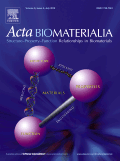
Acta Biomaterialia
Connecting Science and Technology through BiomaterialsActa Biomaterialia, published by Elsevier Science Ltd, is a leading journal in the fields of biochemistry, biomaterials, biomedical engineering, biotechnology, and molecular biology. With an ISSN of 1742-7061 and an E-ISSN of 1878-7568, this prestigious journal has secured a remarkable position in the academic community, evidenced by its inclusion in the Q1 category across multiple disciplines for 2023. It ranks impressively at #21 in biochemistry, #16 in biomedical engineering, #18 in biotechnology, and #11 in biomaterials, reflecting its high impact and relevance to ongoing research and development. The journal provides a platform for disseminating innovative research and advancements in the design and application of biomaterials, contributing to scientific discussions that propel the field forward. Although it does not currently offer open access options, Acta Biomaterialia continues to attract contributions that advance our understanding of biomaterials and their interactions with biological systems, ensuring that researchers, professionals, and students remain informed about the latest trends and breakthroughs in this rapidly evolving area of study.
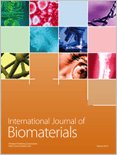
International Journal of Biomaterials
Unlocking the potential of biomaterials for enhanced medical technologies.The International Journal of Biomaterials, published by HINDAWI LTD, is a premier platform for disseminating groundbreaking research in the fields of biomaterials and biomedical engineering. With an Open Access approach since 2009, this journal provides unhindered access to innovative studies and applications aimed at advancing medical technologies and improving patient outcomes. Notably ranked in the Q3 category for both Biomaterials and Biomedical Engineering in 2023, it serves as an essential resource for researchers, practitioners, and students alike. The journal's Scopus rankings, including a 49th percentile in Biomedical Engineering and a 40th percentile in Biomaterials, further underscore its growing prominence in the academic community. With contributions spanning from 2011 to 2024, the journal seeks to foster collaborative research and promote developments that enhance the understanding and application of biomaterials in healthcare.

Biomedical Engineering Online
Bridging the gap between engineering excellence and medical advancements.Biomedical Engineering Online, published by BMC, is an esteemed open-access journal in the United Kingdom that has been advancing the field of biomedical engineering since its inception in 2002. With a commitment to disseminating high-quality research, the journal encompasses a broad scope, including innovative studies in biomaterials, imaging technologies, and medical applications. Recognized within the Q2 quartile for various categories such as Biomaterials and Biomedical Engineering, it ranks favorably among its peers: Rank #58 out of 333 in Radiology, and Rank #15 out of 63 in Radiological and Ultrasound Technology in the Scopus database. These rankings, coupled with an open-access model, ensure that critical advancements in medical technology are accessible to researchers, health professionals, and students globally. As it continues through its converged years from 2002 to 2024, Biomedical Engineering Online remains an invaluable resource for anyone involved in the cutting-edge intersection of engineering and medicine.

Bioengineering-Basel
Catalyzing Collaboration in BioengineeringBioengineering-Basel, an esteemed journal published by MDPI, stands at the forefront of innovation in the field of bioengineering since its inception in 2014. With an E-ISSN of 2306-5354, this fully Open Access journal based in Switzerland provides a platform for researchers and professionals to disseminate cutting-edge findings across various aspects of bioengineering, including biomaterials, tissue engineering, and biopharmaceuticals. The journal has been recognized with a Q3 ranking in the 2023 Bioengineering category, reflecting its commitment to quality and relevance. By facilitating widespread accessibility to academic knowledge, Bioengineering-Basel aims to foster collaboration and stimulate thought leadership within the global research community, making it an indispensable resource for students, scholars, and industry practitioners alike.
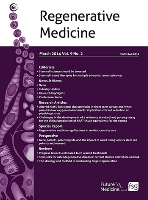
Regenerative Medicine
Connecting Minds for Revolutionary Health SolutionsRegenerative Medicine, published by Taylor & Francis Ltd, is a pivotal journal within the field of biomedical research, focusing on the innovative advances in regenerative and restored functions in human health. With an ISSN of 1746-0751 and an E-ISSN of 1746-076X, this esteemed journal boasts a commendable impact factor within its categories, notably holding the Q2 status in Embryology and Q3 in Biomedical Engineering as of 2023. Covering a broad spectrum of topics from stem cell research to tissue engineering, it serves as a crucial platform for interdisciplinary collaboration among researchers, professionals, and students dedicated to the regeneration of tissues and organs. Given its comprehensive scope from 2006 to 2024, the journal continues to attract high-quality manuscripts that advance the frontiers of knowledge in regenerative medicine. Researchers and practitioners alike are encouraged to engage with the latest findings and methodologies disseminated in this vital publication.
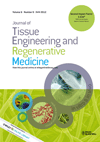
Journal of Tissue Engineering and Regenerative Medicine
Transforming healthcare through cutting-edge research in tissue engineering.Journal of Tissue Engineering and Regenerative Medicine, published by WILEY, stands as a pivotal platform in the fields of biomaterials, biomedical engineering, and regenerative medicine. With an ISSN of 1932-6254 and an E-ISSN of 1932-7005, this journal, based in the United Kingdom, has consistently delivered high-quality research since its inception in 2006, converging critical insights through 2024. With an impressive citation profile reflected in its Scopus rankings—specifically a rank of #58 in Medicine and #75 in Biomedical Engineering—the journal is acknowledged for its substantial impact, as demonstrated by its competitive quartile standings in 2023. Notably, it maintains a Q3 ranking in Biomaterials and Q2 in both Biomedical Engineering and Medicine (miscellaneous), showcasing its influence and relevance in the rapidly evolving interplay between engineering and medicine. The journal serves as a vital resource for researchers and practitioners aiming to stay abreast of innovations and breakthroughs in regenerative therapies, tissue scaffolds, and biomaterials. While not an open-access publication, it fosters academic dialogue and knowledge dissemination that is crucial for advancing the field.
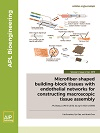
APL Bioengineering
Advancing Bioengineering for a Healthier TomorrowAPL Bioengineering is a premier open-access journal published by AIP Publishing, dedicated to advancing the field of bioengineering and its interdisciplinary applications. Established in 2017, this journal serves as a vital platform for researchers, professionals, and students interested in the critical intersections of bioengineering, biomaterials, biomedical engineering, and biophysics. With an impressive impact factor and consistent rankings in the Q1 category across multiple domains, including biochemistry and materials science, APL Bioengineering has positioned itself among the top journals in its field. The journal aims to publish innovative original research, comprehensive reviews, and insightful case studies that further the understanding and application of bioengineering principles. Since its inception, APL Bioengineering has fostered a community of thought leaders, providing open access to ensure broad dissemination of knowledge and advancements that underpin the future of biomedical innovation.

Tissue Engineering Part B-Reviews
Navigating the Future of Regenerative Medicine Research.Tissue Engineering Part B-Reviews is a premier academic journal published by MARY ANN LIEBERT, INC, focusing on the interdisciplinary field of tissue engineering and regenerative medicine. With an impressive impact factor that places it in the Q1 category across multiple relevant fields—including Biochemistry, Bioengineering, Biomaterials, and Biomedical Engineering—this journal provides a vital platform for researchers and professionals to disseminate cutting-edge findings and comprehensive reviews. Covering a vast scope from 2008 to 2024, the journal is committed to advancing knowledge in the application of engineering principles to biological tissues, making it an indispensable resource for those at the forefront of biomedical innovation. While the journal does not currently offer open access options, its rigorous peer review process ensures high-quality contributions that are essential for academic and practical advancements. The journal's rankings in Scopus reflect its significance, catering to a diverse audience of students, researchers, and practitioners seeking the latest insights in this dynamic field.

Journal of Biological Engineering
Innovating Solutions for a Sustainable FutureJournal of Biological Engineering, published by BMC, stands as a prominent Open Access journal since 2007, dedicated to advancing the interdisciplinary field of biological engineering. With an ISSN of 1754-1611, this UK-based journal aims to provide a platform for researchers and professionals to disseminate innovative and impactful research across various domains including Biomedical Engineering, Environmental Engineering, Cell Biology, and Molecular Biology. The journal's notable rankings in the 2023 category quartiles exemplify its position within the scientific community, featuring Q2 status in Biomedical Engineering and Environmental Engineering, along with Q3 in Cell Biology and Q2 in Molecular Biology. By maintaining robust Scopus rankings and ensuring free access to cutting-edge research, the Journal of Biological Engineering plays a crucial role in driving discovery and collaboration among scholars, thereby enriching both the academic landscape and applied sciences.